Navigation
Action Health Incorporated
AHI is a non-profit, non-governmental organisation dedicated to the promotion of adolescent health and development. It serves as a leading advocate and catalyst for change in the present poor status of adolescents’ well-being by increasing public awareness and implementing innovative education, healthcare and youth development programmes. T
Location:
Lagos, Nigeria
Problem Overview:
Adolescents (ages 10-19) in Nigeria are caught between tradition and evolving socio-cultural trends brought about by the changing world order, advance in technology and the influence of cultures from around the world. These over 26 million Nigerians, representing 22% of the population, are passing through a most vulnerable period of their lives without appropriate reproductive health information or access to counseling and clinical healthcare services to divert the epidemic levels of complications from unsafe induced abortions and STD/HIV/AIDS that the country continues to witness. The result has been increases in reported cases of unwanted teenage pregnancies, deaths arising from abortion complications, and increasing incidence of STDs and HIV/AIDS among these adolescents.
AHI is a non-profit, non-governmental organisation dedicated to the promotion of adolescent health and development. It serves as a leading advocate and catalyst for change in the present poor status of adolescents’ well-being by increasing public awareness and implementing innovative education, healthcare and youth development programmes. The organisation believes that adolescents need to be aware of the various factors that influence the experiences they have at this stage of their lives and that only teenagers who know themselves, value themselves, are aware of their options and have the appropriate skills can abstain from or practice safe and responsible sex.
AHI’s vision is to become:
- A leading advocate for adolescent health issues and a centre for model and experimental projects to address adolescent health needs, which will be adapted by organisations nationally, including developing a model multi-service centre for youths;
- A national training institute for sexuality education that would develop local expertise for addressing adolescent sexuality;
- The foremost resource centre on issues concerning adolescence that would provide accurate, up-to-date and comprehensive information, materials and data for adolescents, researchers, the media and programme implementers;
Average age at first intercourse for girls is just above 16 years and a little higher for boys. Teenage girls account for 80% of unsafe abortion complications treated in Nigerian hospitals. Many of these complications are life-threatening and result in permanent infertility. Complications from unsafe abortion are a leading contributor to Nigeria’s maternal mortality ratio: 800 per 100,000 live births. The incidence of STDs and HIV infection is also highest among young people, with 15 – 29 year-olds accounting for about 62% of the cumulative AIDS cases in Nigeria.
It is the concern about the appalling status of adolescents’ well-being across the country that made AHI take on the mandate to serve as catalyst for change in the poor health status of adolescents in Nigeria. Over the past eleven years, it has been involved in activities that have affected thousands of adolescents across the country by creating awareness and providing information and education about their reproductive health and concerns in order to enable them to make responsible and informed choices.
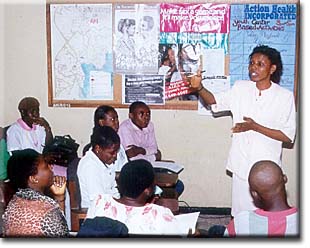 |
When AHI was established in 1989, its founders' concern was the limited access that young people in Nigeria had to preventive information and education about the myriad of ailments affecting them. The organisation therefore set out to gather and disseminate health information that would improve the quality of their lives. However in a very short while, it was confirmed that health education is only a partial solution to health problems. Rather, the environment and skills to cope with it, the challenging of social norms and the ability of people to take positive action are equally potent components of achieving improved health status. AHI therefore set out to develop strategies for addressing these problems on a holistic scale. Today, it has developed a unique Adolescent Reproductive Health Programming Model, offering:
- school-based and youth center-based sexuality education;
- youth mentoring through practical experience gained from job skills development / internships;
- clinical health services offering a wide range of sexual health options to enable young people make informed choices;
- networking and technical assistance to other youth-serving NGOs; as well as
- advocacy and public education programs to increase government/community awareness and action directed at addressing adolescent health and development needs.
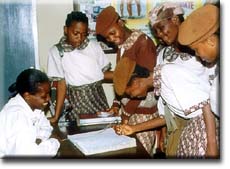 |
An integral part of AHI’s programming is the involvement of young people. Young people play a frontline role in many of AHI’s programmes. They organise activities, represent AHI at local, national and international conferences and are offered one-year internship positions to acquire job skills.
Providing Comprehensive Sexuality Education and Youth-friendly Clinical Services
AHI implements an intensive peer education programme, through the establishment of Health and Life Planning Clubs in the 35 public secondary schools it serves. The peer educators– selected by their school mates and endorsed by their teachers– are trained in sexuality and reproductive health issues as well as communication and presentation skills. The training lasts one week, with six-hour sessions daily, usually followed up by refresher courses in subsequent years. The peer educators are assisted by teachers (who have also received similar training) to coordinate the activities of the club in their school. Club activities range from talks, games, drama and video shows on issues of concern to young people. Over 500 peer educators have been trained between 1993 and 1999.
Complementing the club activities, is an information, education and communication (IEC) programme at AHI’s youth centre.
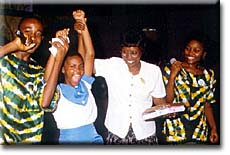 |
This is in addition to outreach programmes such as the annual Teenage Festival of Life when students from many secondary schools come together for a national essay competition and debates, and to perform their own songs, plays and poems on themes such as teenage pregnancy, STDs, AIDS and parent-child communication To further strengthen the program's effectiveness, days earmarked for national and international celebrations. For example, World AIDS Day and Valentine’s Day are used to reach out to young people with positive messages. At these workshops, students discuss ways of abstaining from sex, dealing with peer pressure, and avoiding and responding to the AIDS situation in the society, using role play, songs and drama sketches.
AHI also runs an Adolescent Reproductive Health Services Clinic. The clinic opened its doors to clients in 1993 and now sees over 1000 adolescents who make well over 2000 visits per year.
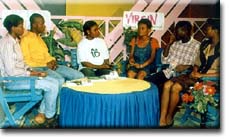 |
It offers services dealing with concerns about general and sexual health, birth control use, pregnancy options, reproductive tract infection diagnosis and treatment as well as HIV/AIDS counseling. A unique feature of the clinic is that its clients are exclusively young people who are provided services in a friendly, non-judgmental manner. While waiting to see the doctor or nurse, clients talk with a youth health educator who gives them basic information about their bodies, STDs and HIV. The presence of the young educator helps to reassure clients that they are in a place where they can be confident to share personal information about themselves.
Over the years, the clinic personnel have developed skills in managing these concerns for clients. They have also developed operational guidelines and protocol that serve as the premise on which the clinic and programme staff provide technical support to other groups who seek to attain the goal of youth-friendly service provision.
In order to make the service more accessible, mobile clinics were initiated where the clinic personnel visit designated schools during school hours to provide the students with similar clinical services to those they can obtain at the youth centre-based clinic. Many students had indicted they weren’t able to visit the youth-centre’s clinic because of time constraint, long travel distance and transportation cost. Recently too, in response to these concerns, AHI opened clinics in four (4) of the secondary schools it serves. The space and infrastructure for the clinics are provided by the schools. These clinics have witnessed increased visits compared to those at the youth centre. More schools have also indicated an interest in having a clinic on their premises and modalities for setting these up are ongoing.
Resource Materials Production
Another key area of activity for AHI is the production of publications and videos– a response to the dearth of information about adolescent sexuality and reproductive health. Chief among these is the Guidelines for Comprehensive Sexuality Education in Nigeria published in 1996. The Guidelines, based on a prototype published by the Sexuality Information and Education Council of the United States, is a framework to facilitate the development of sexuality education curricula, textbooks and programmes, as well as to evaluate existing programmes. AHI also publishes a quarterly newsletter Growing Up, written for young people by young people. Many of the articles are personal stories, statements of opinion and poems, attractively illustrated with photos and line drawings. The newsletter has a readership of over 10,000 both within and outside Nigeria and a Braille edition is planned for the future. Recently too, AHI published a book Meeting the Sexual and Reproductive Health Needs of Young People in Nigeria, which sheds light on the status of adolescent health and why they are at risk, in addition to proposing ways through which key stakeholders can make a difference. The book has become a valuable resource for those involved in adolescent health programming in Nigeria.
AHI’s participatory video production unit began in 1992 and has so far produced 10 videos on various issues surrounding adolescence. It is run entirely by young people who have received training in the technicalities of script writing, video production and editing. Some of their productions include:
- Be Wise and Other Songs, a 22-minute, 5-track musical video that was produced to counter the negative messages young people receive about sex from the media. The young artistes sing about issues such as STDs, AIDS, teenage pregnancy, drug abuse, as well as services available at the AHI Youth Centre.
Poetic Justice: a 90-minute video that talks about teen pregnancy, abortion and the challenges of single-parenthood.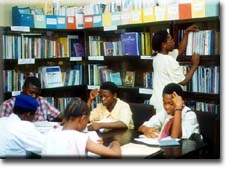
- Our Future, Our World: a 28-minute documentary film to advocate for sexuality education among opinion leaders and policy makers.
AHI also has a library resources unit that stocks books, journals, audio-visuals and CD-ROMS on various adolescent reproductive health and sexuality issues. Researchers, program implementers and young people themselves use the library regularly and it is fast becoming the foremost resource centre that it is envisioned to be.
Advocacy and Public Enlightenment
AHI pursues a vigorous community advocacy and public enlightenment programme. The advocacy efforts are aimed at changing the erroneous public perception and negative attitude to the provision of sexuality education among parents and community opinion leaders.
AHI realised the value of advocacy and having the support of stakeholders when in 1992, its activities in the schools it operated in were banned by the Ministry of Education following a newspaper article that it was “corrupting” children by promoting family planning among them. Parents who hitherto allowed their children and wards to participate at AHI’s activities stopped them from visiting the youth centre. AHI responded to this situation by meeting with the young people it served, top government officials and parents, as well as opening its offices to scrutiny by journalists. In a short while, newspaper reports in support of AHI began to be published. What finally tipped the scales in AHI’s favour was the government’s decision to seek the opinion of the principals of the schools in which AHI had been operating. One principal after the other reported that AHI was providing valuable information that young people needed, but which were absent from the curriculum. Three months after the ban was imposed, the government conceded it had erred and allowed AHI to resume its activities in schools.
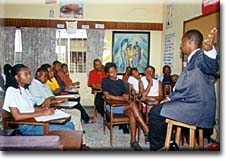 |
This experience, though daunting, propelled AHI to embark on its advocacy project, something it earlier thought unnecessary. The project addresses the lack of political commitment and policy instruments in favour of sexuality education by using skillful persuasion to get others to support the cause of adolescent reproductive health and particularly, that of access of comprehensive sexuality education for young people, thus breaking the national culture of silence around adolescent sexuality. AHI regularly open its doors to parents and opinion leaders to see for themselves what it does, in addition to conducting outreach activities to community centers and market places. It convenes meetings and seminars for policy makers to build consensus around adolescent reproductive health issues and has also forged positive relations with the media, who regularly report its activities.
These efforts have indeed paid off. In January 1999, a national conference on adolescent reproductive health was convened in collaboration with the Federal Ministry of Health, during which all stakeholders met to discuss pertinent adolescent reproductive health issues. A major outcome of the conference was the development of a document, “National Strategic Framework for the Promotion of Adolescent Reproductive Health in Nigeria,” which emphasizes the key areas of focus in planning for the health of Nigeria’s young people. Even more significant was the approval given in March 1999 by Nigeria’s highest education policy-making body, the National Council on Education, for the introduction of comprehensive sexuality education into school curricula nationally.
Resources, Priorities and Future Challenges
AHI has received funding from the MacArthur Foundation, International Women’s Health Coalition, Ford Foundation, Packard Foundation and the country office of UNICEF and UNDCP. The funding from these donors has ensured the sustainability of the programme. AHI on its part also generates funds from various activities to complement that received from donors.
Because of its success, there have been calls for AHI to expand its work to other states in the federation, a call AHI continues to turn down. According to its project director, remaining a small organisation that AHI presently is, is a survival strategy, a way of coping with the pressures of being an organisation dealing with still very controversial issues. Rather, AHI prefers to assist interested individuals and NGOs with a similar goal, by offering technical assistance and opportunities for them to intern at AHI.
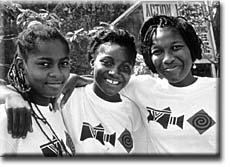 |
Despite its success, AHI still faces enormous challenges. Chief among these is addressing the vulnerability of young girls to compromising their sexual health as a result of the prevailing economic situation. This situation has continued to strengthen its resolve to empower young girls to become economically independent and engage in health-promoting behaviours. In addition, a lot more still needs to be done in the direction of garnering public support for providing young people access to sexuality information. Acknowledging that various groups have diverse interests and concerns, it is learning to be flexible enough to make responsible compromises without jeopardizing the ultimate goal of improving the health and development of young people in Nigeria.
Additional Comments
Awarded the 1999 World Association of Sexology (WAS) Sexuality Education Award. The award is given to the best organization that has demonstrated the promotion of sexuality education in their country through innovative programming.
Comments from some of the young people that have benefited from the program:
“I’ve gained a lot of experience meeting youths and seeing the facts of AIDS and teenage pregnancy. I always endeavour of educate anybody who comes my way about the realities of AIDS and STDs. My participation on AHI’s programs has taught me how to make responsible decision in life.” 19-year old Adeola Olunloyo (F)
“I’ve gained a lot through my participation on the Youth Skills Development Program. I’ve been able to develop my self-esteem and have improved my communication skills, especially with my parents. I used to be very shy, but now, I’m more confident. I’ve met a lot of people and been to places as well. Above all, I’ve become computer literate!” 19-year old Ajibike Fowowe (F)
“I’ve been exposed to accurate information about issues I’ve always wanted to know about. These include friendship, love, dating, STDs and HIV/AIDS. I’ve also become more assertive and learned goal-setting and decision-making skills. The knowledge and experience I acquired at AHI has been worthwhile.” 26-year old Kole Ogumoroti (M) trained as a peer educator in 1991.
“The most important skill I acquired on the program is the ability to communicate better with my parents. Through AHI, I’ve also learnt how to handle the complexities of male-female relationships, something most of my mates are still grappling with. Very probably, without Action Health, I would have just been another girl on the streets of Lagos, but today, I’m as unique as I would ever have wanted to be.” 27-year old Ijeoma Okereke (F) who was trained as a peer educator in 1992.
While no formal evaluations have been conducted to determine the impact of these efforts on the target audiences, data collected and analysed during various programme activities showed that:
Comprehensive Sexuality Education and Youth-friendly Clinical Services
- Over 150,000 adolescents were reached with reproductive health and sexuality messages between 1995 and 1999.
- Pre- and post-test scores indicated that participants at workshops and training sessions recorded an average of 64% increase in knowledge.
- Of the almost 1,500 clients the clinic attended to between September 1998 and February 2000, 93.3% knew two methods of preventing STDs, 86.8% three methods of pregnancy prevention and 81.8% could effectively describe and demonstrate proper use of the birth-control method they accepted.
Resource Materials Production
- AHI’s library stocks over 2,000 books, journals, audio-visuals and CD-ROMS
- The library receives up to 1000 users annually.
Advocacy and Public Enlightenment
- Over 100 organisations nationwide have endorsed the Guidelines for Comprehensive Sexuality Education in Nigeria and are using it in their programming efforts.
- The Lagos State Government has also approved the introduction of sexuality education in its secondary school curricula and a committee to ensure its implementation has commenced work.
- Religious organisations that were hitherto opposed AHI’s work have begun to invite AHI to make presentations to their adult and youth groups. Seven such presentations have made in this year alone.
A comprehensive evaluation of the programme’s impact on the community is scheduled for next year. Meanwhile, AHI is continuing in its determination to consolidate its programming efforts. It has already secured a grant from the Packard Foundation to develop a comprehensive sexuality education curriculum for training educators and healthcare providers in Nigeria. The curriculum will provide the template for sexuality education integration efforts as well as the tool for the training of educators and healthcare providers in the existing clinic facilities within the 84 federal government colleges located all over Nigeria. It has also secured a grant from the Ford Foundation to intensify its advocacy efforts as well as develop a program to increase opportunities for the acquisition of a holistic package of health and development information, including skills and competencies, to facilitate the transition from adolescence to responsible adulthood for a core of 100 young people aged 16 – 24 years from the target communities. The grant will also provide AHI the opportunity to document and publish its experiences in the various components of its programming efforts to facilitate sharing with other organisations and stakeholders across the country.
Highlight of Action Health Incorporated’s programme: http://www.siecus.org/inter/nigeria/acti/acti0000.html
Generation 2000, a documentary film that shows the plight of the Nigerian girl-child. It’s goal is to draw public attention to the Beijing +5 Review, foster positive images of programs and policies to improve girls’ life options and provide a positive, forward-looking start for the final negotiations of the Beijing +5 outcome document. [Copies can be obtained from International Women’s Health Coalition, 24 East 21 Street, New York, NY 10010 Tel.: (212) 979-8500 Fax: (212) 979-9009]
A Common Cause, Strategies for Hope Book 12, ActionAID, 1997. This book describes how NGOs and community groups in Botswana, Nigeria and Tanzania have pioneered fresh approaches to sexuality education and AID prevention. [Copies can be obtained from TALC, P.O. Box 49, St. Albans, Hets AL1 5TX, UK Fax: (44) 1727 846852]
Meeting the Cairo Challenge: Implementing the ICPD Program of Action, Family Care International, 1999. This document for decision-makers and program planners describes national programs and model projects related to implementation of the 1994 ICPD Programme of Action. Highlights successful strategies, emerging opportunities, lessons learned, and obstacles related to taking a comprehensive approach to the provision of sexual and reproductive health care. [Copies can be obtained from fcipubs@familycareintl.org.]
Nigerian Guidelines for Sexuality Education Introduced (1996) James L. Shortridge. SIECUS Report, Vol. 25 No. 2 [Copies can be obtained from SIECUS, 130 West 42nd Street, Suite 350, New York, NY 10036-7802, Phone: 212/819-9770, Fax: 212/819-9776, siecus@siecus.org]
Submitted by:
Adedoyin Onasanya
donasanya@yahoo.com
8, Jogunosinmi Street,
Off Obafemi Awolowo Way,
Alausa-Ikeja, Lagos,
NIGERIA
+234 (1) 2881103
Contacts:
Nike Esiet, Project Director
Action Health Incorporated
Directs and supervises the implementation of organisational activities. Identifies the reproductive health needs of Nigerian adolescents; maintains and improves the coverage and quality of services in meeting those needs effectively and efficiently within the overall policy of the organisation.
Abimbola Jide-Aremo, Senior Programme Officer
Action Health Incorporated
Coordinates and supervises the day-to-day activities, and provides professional and technical advice and assistance of all project staff.
Phone +234 (1) 774-3745 NIGERIA
Fax +234 (1) 863198 NIGERIA
Plot 54 Somorin Street
Ifako-Gbagada, Lagos
NIGERIA
Action Health Incorporated’s email: info@actionhealthinc.org,
- Login to post comments

Search
Latest articles
Agriculture
- World Water Week: Healthy ecosystems essential to human health: from coronavirus to malnutrition Online session Wednesday 24 August 17:00-18:20
- World Water Week: Healthy ecosystems essential to human health: from coronavirus to malnutrition Online session Wednesday 24 August 17:00-18:20
Air Pollution
- "Water and Sanitation-Related Diseases and the Changing Environment: Challenges, Interventions, and Preventive Measures" Volume 2 Is Now Available
- Global Innovation Exchange Co-Created by Horizon International, USAID, Bill and Melinda Gates Foundation and Others
Biodiversity
- It is time for international mobilization against climate change
- World Water Week: Healthy ecosystems essential to human health: from coronavirus to malnutrition Online session Wednesday 24 August 17:00-18:20
Desertification
- World Water Week: Healthy ecosystems essential to human health: from coronavirus to malnutrition Online session Wednesday 24 August 17:00-18:20
- UN Food Systems Summit Receives Over 1,200 Ideas to Help Meet Sustainable Development Goals
Endangered Species
- Mangrove Action Project Collaborates to Restore and Preserve Mangrove Ecosystems
- Coral Research in Palau offers a “Glimmer of Hope”
Energy
- Global Innovation Exchange Co-Created by Horizon International, USAID, Bill and Melinda Gates Foundation and Others
- Wildlife Preservation in Southeast Nova Scotia
Exhibits
- Global Innovation Exchange Co-Created by Horizon International, USAID, Bill and Melinda Gates Foundation and Others
- Coral Reefs
Forests
- NASA Satellites Reveal Major Shifts in Global Freshwater Updated June 2020
- Global Innovation Exchange Co-Created by Horizon International, USAID, Bill and Melinda Gates Foundation and Others
Global Climate Change
- It is time for international mobilization against climate change
- It is time for international mobilization against climate change
Global Health
- World Water Week: Healthy ecosystems essential to human health: from coronavirus to malnutrition Online session Wednesday 24 August 17:00-18:20
- More than 400 schoolgirls, family and teachers rescued from Afghanistan by small coalition
Industry
- "Water and Sanitation-Related Diseases and the Changing Environment: Challenges, Interventions, and Preventive Measures" Volume 2 Is Now Available
- Global Innovation Exchange Co-Created by Horizon International, USAID, Bill and Melinda Gates Foundation and Others
Natural Disaster Relief
- STOP ATTACKS ON HEALTH CARE IN UKRAINE
- Global Innovation Exchange Co-Created by Horizon International, USAID, Bill and Melinda Gates Foundation and Others
News and Special Reports
- World Water Week: Healthy ecosystems essential to human health: from coronavirus to malnutrition Online session Wednesday 24 August 17:00-18:20
- STOP ATTACKS ON HEALTH CARE IN UKRAINE
Oceans, Coral Reefs
- World Water Week: Healthy ecosystems essential to human health: from coronavirus to malnutrition Online session Wednesday 24 August 17:00-18:20
- Mangrove Action Project Collaborates to Restore and Preserve Mangrove Ecosystems
Pollution
- Zakaria Ouedraogo of Burkina Faso Produces Film “Nzoue Fiyen: Water Not Drinkable”
- "Water and Sanitation-Related Diseases and the Changing Environment: Challenges, Interventions, and Preventive Measures" Volume 2 Is Now Available
Population
- "Water and Sanitation-Related Diseases and the Changing Environment: Challenges, Interventions, and Preventive Measures" Volume 2 Is Now Available
- "Water and Sanitation-Related Diseases and the Changing Environment: Challenges, Interventions, and Preventive Measures" Volume 2 Is Now Available
Public Health
- Honouring the visionary behind India’s sanitation revolution
- Honouring the visionary behind India’s sanitation revolution
Rivers
- World Water Week: Healthy ecosystems essential to human health: from coronavirus to malnutrition Online session Wednesday 24 August 17:00-18:20
- Mangrove Action Project Collaborates to Restore and Preserve Mangrove Ecosystems
Sanitation
- Honouring the visionary behind India’s sanitation revolution
- Honouring the visionary behind India’s sanitation revolution
Toxic Chemicals
- "Water and Sanitation-Related Diseases and the Changing Environment: Challenges, Interventions, and Preventive Measures" Volume 2 Is Now Available
- Actions to Prevent Polluted Drinking Water in the United States
Transportation
- "Water and Sanitation-Related Diseases and the Changing Environment: Challenges, Interventions, and Preventive Measures" Volume 2 Is Now Available
- Urbanization Provides Opportunities for Transition to a Green Economy, Says New Report
Waste Management
- Honouring the visionary behind India’s sanitation revolution
- Honouring the visionary behind India’s sanitation revolution
Water
- Honouring the visionary behind India’s sanitation revolution
- Honouring the visionary behind India’s sanitation revolution
Water and Sanitation
- Honouring the visionary behind India’s sanitation revolution
- Honouring the visionary behind India’s sanitation revolution

